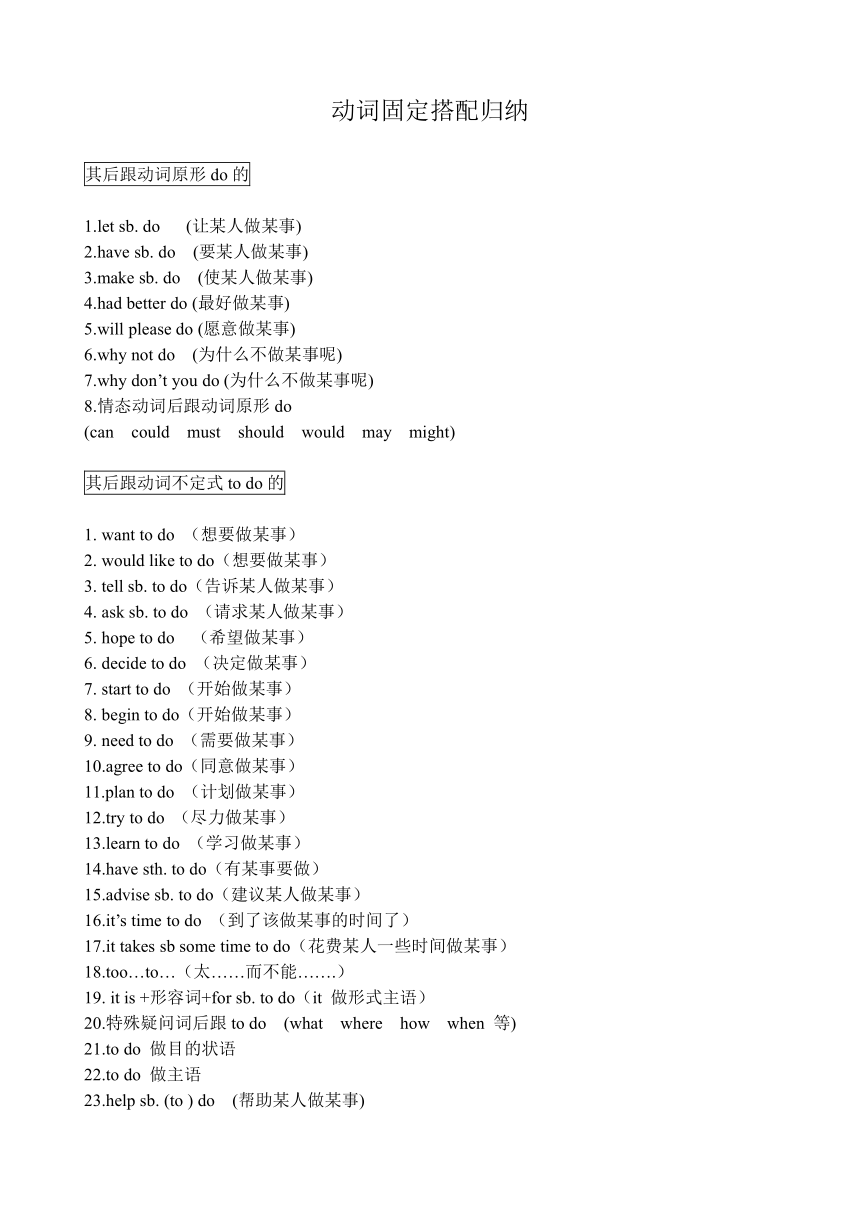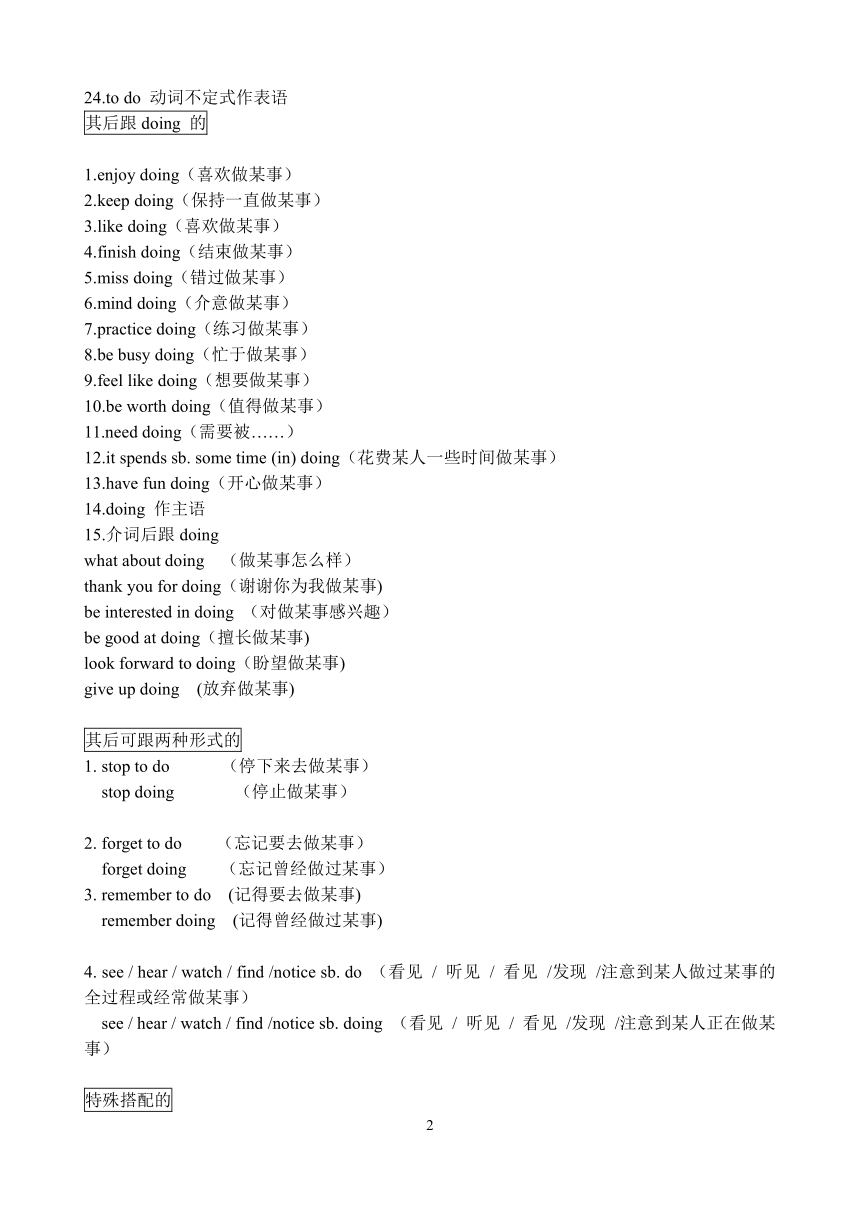2023届中考英语一轮复习:动词固定搭配归纳与动词时态搭配
文档属性
| 名称 | 2023届中考英语一轮复习:动词固定搭配归纳与动词时态搭配 |  | |
| 格式 | doc | ||
| 文件大小 | 31.0KB | ||
| 资源类型 | 教案 | ||
| 版本资源 | 通用版 | ||
| 科目 | 英语 | ||
| 更新时间 | 2022-10-27 11:37:23 | ||
图片预览


文档简介
动词固定搭配归纳
其后跟动词原形do的
1.let sb. do (让某人做某事)
2.have sb. do (要某人做某事)
3.make sb. do (使某人做某事)
4.had better do (最好做某事)
5.will please do (愿意做某事)
6.why not do (为什么不做某事呢)
7.why don’t you do (为什么不做某事呢)
8.情态动词后跟动词原形do
(can could must should would may might)
其后跟动词不定式to do的
1. want to do (想要做某事)
2. would like to do(想要做某事)
3. tell sb. to do(告诉某人做某事)
4. ask sb. to do (请求某人做某事)
5. hope to do (希望做某事)
6. decide to do (决定做某事)
7. start to do (开始做某事)
8. begin to do(开始做某事)
9. need to do (需要做某事)
10.agree to do(同意做某事)
11.plan to do (计划做某事)
12.try to do (尽力做某事)
13.learn to do (学习做某事)
14.have sth. to do(有某事要做)
15.advise sb. to do(建议某人做某事)
16.it’s time to do (到了该做某事的时间了)
17.it takes sb some time to do(花费某人一些时间做某事)
18.too…to…(太……而不能…….)
19. it is +形容词+for sb. to do(it 做形式主语)
20.特殊疑问词后跟to do (what where how when 等)
21.to do 做目的状语
22.to do 做主语
23.help sb. (to ) do (帮助某人做某事)
24.to do 动词不定式作表语
其后跟doing 的
1.enjoy doing(喜欢做某事)
2.keep doing(保持一直做某事)
3.like doing(喜欢做某事)
4.finish doing(结束做某事)
5.miss doing(错过做某事)
6.mind doing(介意做某事)
7.practice doing(练习做某事)
8.be busy doing(忙于做某事)
9.feel like doing(想要做某事)
10.be worth doing(值得做某事)
11.need doing(需要被……)
12.it spends sb. some time (in) doing(花费某人一些时间做某事)
13.have fun doing(开心做某事)
14.doing 作主语
15.介词后跟doing
what about doing (做某事怎么样)
thank you for doing(谢谢你为我做某事)
be interested in doing (对做某事感兴趣)
be good at doing(擅长做某事)
look forward to doing(盼望做某事)
give up doing (放弃做某事)
其后可跟两种形式的
1. stop to do (停下来去做某事)
stop doing (停止做某事)
2. forget to do (忘记要去做某事)
forget doing (忘记曾经做过某事)
3. remember to do (记得要去做某事)
remember doing (记得曾经做过某事)
4. see / hear / watch / find /notice sb. do (看见 / 听见 / 看见 /发现 /注意到某人做过某事的全过程或经常做某事)
see / hear / watch / find /notice sb. doing (看见 / 听见 / 看见 /发现 /注意到某人正在做某事)
特殊搭配的
prefer doing to doing 比起…更喜欢…(喜欢前者)
prefer to do …rather than do… 宁可…也不…
would rather do…than do… 与其…不如…
动词时态归纳
一般现在时
动词构成 be 动词 (am / is / are)
实意动词 当主语为第三人称单数时,用动词的单三形式
(如go——goes),其余人称用动词原形。
时间状语标志词 always usually often sometimes
every day once a week in the morning
客观规律或客观事实也使用一般现在时。
句式变换
He has a book. (肯定句) He doesn’t have a book.. (否定句)
Does he have a book (一般疑问句) Yes, he does./No, he doesn’t. (肯定、否定回答)
当划线提问表示频度的副词或短语时,用how often 来提问。
Tom plays football once a week. How often does Tom play football
一般过去时
动词构成 be 动词 (was / were)
实意动词 (用所给动词的过去式,分为规则和不规则两类)
时间状语标志词 yesterday two days ago last week just now (刚才) in 2007
this morning (表示动作还未发生时,用作一般将来时;
表示动作已经发生时,用作一般过去时)
句式变换
He got up early this morning. He didn’t get up early this morning.
Did he get up early this morning Yes, he did. / No, he didn’t.
现在进行时
动词构成 am / is / are doing
时间状语标志词 now Listen! Look! at the moment (此时此刻)
句式变换
I am reading a book now. I am not reading a book now.
Are you reading a book now Yes, I am. / No, I am not.
过去进行时
动词构成 was / were doing
时间状语标志词 at this / that time yesterday(在昨天的这个/那个时候)
at 8 o’clock last night from 8 to 10 yesterday evening.
When引导的时间状语从句,当表示一个动作(A)发生的时候另外一个动作(B)正在进行时,则(A)用一般过去时,(B)用过去进行时。
When I got home, Tom was doing his homework..
(当我到家的时候,Tom正在做作业。)
When I was walking in the street yesterday, I met an old friend of mine.
(昨天当我正在街上散步的时候,遇到了一个老朋友。)
一般将来时
动词构成 will do am / is /are going to do
时间状语标志词 tomorrow next week soon (不久) in two days (两天后)
this evening (表示动作还未发生,用作一般将来时;
表示动作已经发生,用作一般过去时)
句式变换
We will go to Shanghai tomorrow. We won’t go to Shanghai tomorrow.
Will you go to Shanghai tomorrow Yes, we will. / No, we won’t.
Lucy will go to America in two days. How soon will Lucy go to America
当划线提问in+段时间时,用how soon 来提问。
过去将来时
动词构成 would do was / were going to do
时间状语标志词 此时态一般用于宾语从句中,当主句为一般过去时,从句表将来,那么从句就使用过去将来时。
Tom asked if Lucy would go to Shanghai soon.
I said I would leave school in two weeks.
现在完成时
动词构成 have / has +动词的过去分词
时间状语标志词 already yet just(刚刚)ever never before so far (到目前为止)
for three years since three years ago since he came to China
twice so far (到目前为止) recently(最近)
in the last 15 years(在最近的15年里)
句式变化
I have already finished my homework.. I haven’t finished my homework yet.
Have you finished your homework yet Yes, I have. / No, I haven’t.
Tom has learnt English for three years. How long has Tom learnt English
Tom has learnt English since three years ago. How long has Tom learnt English
当划线提问for, since时,用how long 来提问。
过去完成时
动词构成 had +动词的过去分词
时间状语标志词 by the end of last year (到去年年底为止)
此时态还用于时间状语从句中,当一个动作(A)发生的时候,另一个动作(B)已经完成,则(A)用一般过去时,(B)用过去完成时。
When I got home, Tom had finished his homework.
(当我到家的时候,Tom 已经完成了作业。)
Before Lucy came to China, she had learnt 300 Chinese words.
(在Lucy来中国之前,她已经学习了300个汉字了。)
PAGE
2
其后跟动词原形do的
1.let sb. do (让某人做某事)
2.have sb. do (要某人做某事)
3.make sb. do (使某人做某事)
4.had better do (最好做某事)
5.will please do (愿意做某事)
6.why not do (为什么不做某事呢)
7.why don’t you do (为什么不做某事呢)
8.情态动词后跟动词原形do
(can could must should would may might)
其后跟动词不定式to do的
1. want to do (想要做某事)
2. would like to do(想要做某事)
3. tell sb. to do(告诉某人做某事)
4. ask sb. to do (请求某人做某事)
5. hope to do (希望做某事)
6. decide to do (决定做某事)
7. start to do (开始做某事)
8. begin to do(开始做某事)
9. need to do (需要做某事)
10.agree to do(同意做某事)
11.plan to do (计划做某事)
12.try to do (尽力做某事)
13.learn to do (学习做某事)
14.have sth. to do(有某事要做)
15.advise sb. to do(建议某人做某事)
16.it’s time to do (到了该做某事的时间了)
17.it takes sb some time to do(花费某人一些时间做某事)
18.too…to…(太……而不能…….)
19. it is +形容词+for sb. to do(it 做形式主语)
20.特殊疑问词后跟to do (what where how when 等)
21.to do 做目的状语
22.to do 做主语
23.help sb. (to ) do (帮助某人做某事)
24.to do 动词不定式作表语
其后跟doing 的
1.enjoy doing(喜欢做某事)
2.keep doing(保持一直做某事)
3.like doing(喜欢做某事)
4.finish doing(结束做某事)
5.miss doing(错过做某事)
6.mind doing(介意做某事)
7.practice doing(练习做某事)
8.be busy doing(忙于做某事)
9.feel like doing(想要做某事)
10.be worth doing(值得做某事)
11.need doing(需要被……)
12.it spends sb. some time (in) doing(花费某人一些时间做某事)
13.have fun doing(开心做某事)
14.doing 作主语
15.介词后跟doing
what about doing (做某事怎么样)
thank you for doing(谢谢你为我做某事)
be interested in doing (对做某事感兴趣)
be good at doing(擅长做某事)
look forward to doing(盼望做某事)
give up doing (放弃做某事)
其后可跟两种形式的
1. stop to do (停下来去做某事)
stop doing (停止做某事)
2. forget to do (忘记要去做某事)
forget doing (忘记曾经做过某事)
3. remember to do (记得要去做某事)
remember doing (记得曾经做过某事)
4. see / hear / watch / find /notice sb. do (看见 / 听见 / 看见 /发现 /注意到某人做过某事的全过程或经常做某事)
see / hear / watch / find /notice sb. doing (看见 / 听见 / 看见 /发现 /注意到某人正在做某事)
特殊搭配的
prefer doing to doing 比起…更喜欢…(喜欢前者)
prefer to do …rather than do… 宁可…也不…
would rather do…than do… 与其…不如…
动词时态归纳
一般现在时
动词构成 be 动词 (am / is / are)
实意动词 当主语为第三人称单数时,用动词的单三形式
(如go——goes),其余人称用动词原形。
时间状语标志词 always usually often sometimes
every day once a week in the morning
客观规律或客观事实也使用一般现在时。
句式变换
He has a book. (肯定句) He doesn’t have a book.. (否定句)
Does he have a book (一般疑问句) Yes, he does./No, he doesn’t. (肯定、否定回答)
当划线提问表示频度的副词或短语时,用how often 来提问。
Tom plays football once a week. How often does Tom play football
一般过去时
动词构成 be 动词 (was / were)
实意动词 (用所给动词的过去式,分为规则和不规则两类)
时间状语标志词 yesterday two days ago last week just now (刚才) in 2007
this morning (表示动作还未发生时,用作一般将来时;
表示动作已经发生时,用作一般过去时)
句式变换
He got up early this morning. He didn’t get up early this morning.
Did he get up early this morning Yes, he did. / No, he didn’t.
现在进行时
动词构成 am / is / are doing
时间状语标志词 now Listen! Look! at the moment (此时此刻)
句式变换
I am reading a book now. I am not reading a book now.
Are you reading a book now Yes, I am. / No, I am not.
过去进行时
动词构成 was / were doing
时间状语标志词 at this / that time yesterday(在昨天的这个/那个时候)
at 8 o’clock last night from 8 to 10 yesterday evening.
When引导的时间状语从句,当表示一个动作(A)发生的时候另外一个动作(B)正在进行时,则(A)用一般过去时,(B)用过去进行时。
When I got home, Tom was doing his homework..
(当我到家的时候,Tom正在做作业。)
When I was walking in the street yesterday, I met an old friend of mine.
(昨天当我正在街上散步的时候,遇到了一个老朋友。)
一般将来时
动词构成 will do am / is /are going to do
时间状语标志词 tomorrow next week soon (不久) in two days (两天后)
this evening (表示动作还未发生,用作一般将来时;
表示动作已经发生,用作一般过去时)
句式变换
We will go to Shanghai tomorrow. We won’t go to Shanghai tomorrow.
Will you go to Shanghai tomorrow Yes, we will. / No, we won’t.
Lucy will go to America in two days. How soon will Lucy go to America
当划线提问in+段时间时,用how soon 来提问。
过去将来时
动词构成 would do was / were going to do
时间状语标志词 此时态一般用于宾语从句中,当主句为一般过去时,从句表将来,那么从句就使用过去将来时。
Tom asked if Lucy would go to Shanghai soon.
I said I would leave school in two weeks.
现在完成时
动词构成 have / has +动词的过去分词
时间状语标志词 already yet just(刚刚)ever never before so far (到目前为止)
for three years since three years ago since he came to China
twice so far (到目前为止) recently(最近)
in the last 15 years(在最近的15年里)
句式变化
I have already finished my homework.. I haven’t finished my homework yet.
Have you finished your homework yet Yes, I have. / No, I haven’t.
Tom has learnt English for three years. How long has Tom learnt English
Tom has learnt English since three years ago. How long has Tom learnt English
当划线提问for, since时,用how long 来提问。
过去完成时
动词构成 had +动词的过去分词
时间状语标志词 by the end of last year (到去年年底为止)
此时态还用于时间状语从句中,当一个动作(A)发生的时候,另一个动作(B)已经完成,则(A)用一般过去时,(B)用过去完成时。
When I got home, Tom had finished his homework.
(当我到家的时候,Tom 已经完成了作业。)
Before Lucy came to China, she had learnt 300 Chinese words.
(在Lucy来中国之前,她已经学习了300个汉字了。)
PAGE
2
同课章节目录
- 词法
- 名词
- 动词和动词短语
- 动词语态
- 动词时态
- 助动词和情态动词
- 非谓语动词
- 冠词
- 代词
- 数词和量词
- 形容词副词及其比较等级
- 介词和介词短语
- 连词和感叹词
- 构词法
- 相似、相近词比较
- 句法
- 陈述句
- 一般疑问句和否定疑问句
- 特殊疑问句及选择疑问句
- 反意疑问句
- 存在句(There be句型)
- 宾语从句
- 定语从句
- 状语从句
- 主谓一致问题
- 简单句
- 并列句
- 复合句
- 主谓一致
- 主、表语从句
- 名词性从句
- 直接引语和间接引语
- 虚拟语气
- 感叹句
- 强调句
- 倒装句
- 祈使句
- 句子的成分
- 句子的分类
- 题型专区
- 单项选择部分
- 易错题
- 完形填空
- 阅读理解
- 词汇练习
- 听说训练
- 句型转换
- 补全对话
- 短文改错
- 翻译
- 书面表达
- 任务型阅读
- 语法填空
- 其他资料
